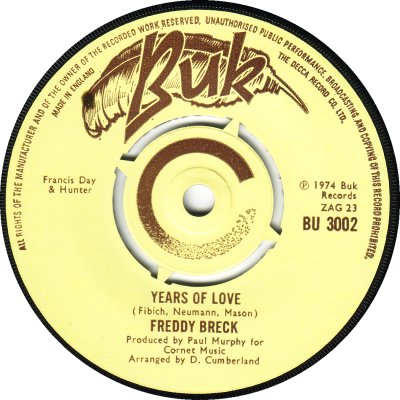
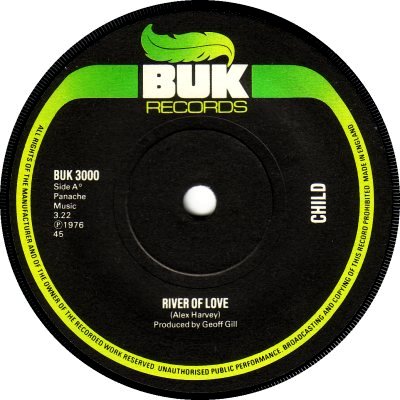
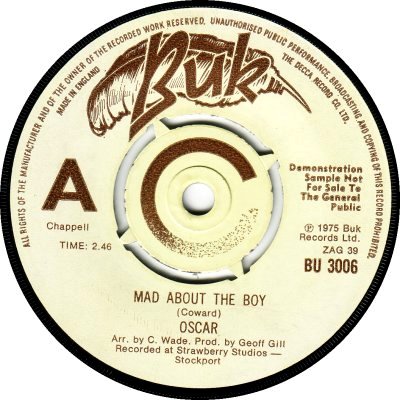
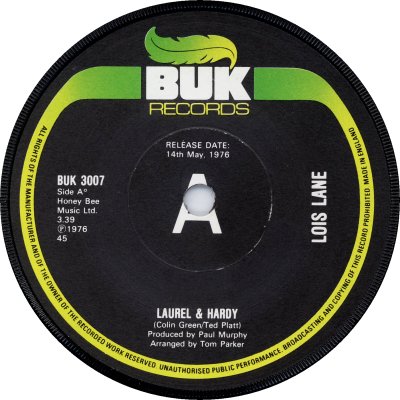
Buk started out in early 1974 as an 'Independent creative services operation' set up by Paul Murphy, international A&R manager of German company BASF (q.v.); its aim was to find new talent and acquire new masters which would be licensed by BASF worldwide ('Music Week', 19th January 1974). BASF was to provide financial backing for the venture ('MW', 22nd January 1977). In the autumn of that year, however, Buk branched out and started issuing records. An advert for the new label in 'MW' of the 5th of October described it as 'BASF's Pop label', and said that it was being distributed by Selecta as part of BASF's new deal with that company; according to the advert Buk saw itself as offering 'Good all-round balanced Pop music'. However, an article in 'MW' of the 22nd of March 1975 stressed Buk's independence from BASF, and quoted Paul Murphy as saying that the only connections between the companies were BASF's worldwide licensing deal for Buk material and Buk's promotional contract for BASF's Pop and MOR product.
Buk moved from Selecta to CBS on the 9th of April 1976 ('MW' advert, 17th April). Reporting on the move, 'MW' of the 24th of April said that the new deal was a four-year pressing and distribution one and that it did not entirely overrule the old contract with Decca - BASF remained with Decca, and Buk would continue to produce for Decca certain material (by Freddie Breck, Candlewick Green and The Million Airs) which originally came to Buk via BASF. Shortly afterwards BASF began what was to be a swift withdrawal from the music business: its closed its UK music division in July 1976, and its contract with Decca was terminated early, at the end of that same month. An attempt to sell off its music division to Polygram affiliate Metronome fell through, with the result that that division was wound up ('MW', 8th January 1977). The end of BASF's involvement in the industry seems to have left Buk with financial problems: 'MW' of the 22nd of January broke the news that the company had terminated its licensing deal with CBS and had gone into voluntary liquidation with debts of £120,000. Nevertheless, it still appears to have been viable as a company. The same article stated that talks about distribution of its products were taking place with EMI, with the aim being that Buk would continue as a logo on an EMI label from the 1st of March. The gossip column of 'MW' of the 12th of March described the agreement as 'imminent'; and Buk material did indeed come out on EMI International, starting on the 1st of April with Crisp's 'Love Makes You Cry' b/w 'Your Move' (INT-531). In order to distance his Buk from BASF, however, Murphy had set up a new company, Honey Bee, which retained the rights to Buk's back catalogue; and the logo which appeared on the records was that of Honey Bee. 'MW' of the 16th of April, commenting on the change, gave Honey Bee's address as 7 Molyneux Street, London W1, and said that Murphy anticipated that it would develop its own fully-fledged label identity in time. Sadly, that seems not to have happened.
BUK put out a respectable number of LPs and singles in the mid-'70s, with a slant towards MOR and Pop. From 1974 until early 1976 manufacture was by Decca and distribution by Selecta, singles appearing in a BU-3000 series (1, 3). Some labels were of a creamier colour than others, but the phenomenon seems to have been random. The switch to a licensing agreement with CBS in April 1974 was accompanied by a new label design (2, 4) and a slightly confusing change of numbers to the BUK-3000s, staring at BUK-3000. Despite the presence on its roster of several artists who had enjoyed, or would enjoy, Chart success - Freddie Breck, Malcolm Roberts, Candlewick Green and Child - Buk failed to register in the Singles Charts, but it achieved a degree of appreciation in Progressive quarters when it released The Enid's 'In The Region Of The Summer Stars' LP (BULP-2014; 1976).
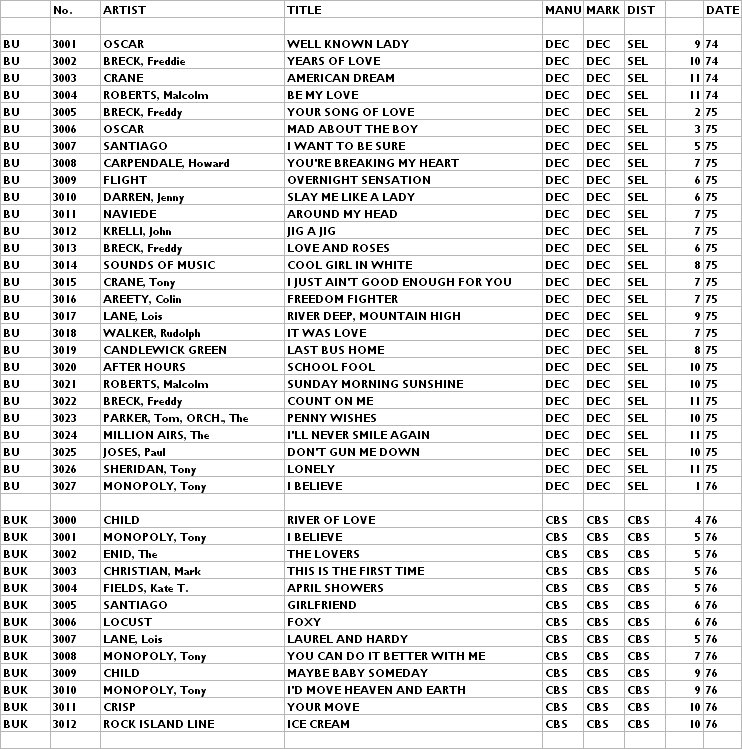


Copyright 2006 Robert Lyons.

